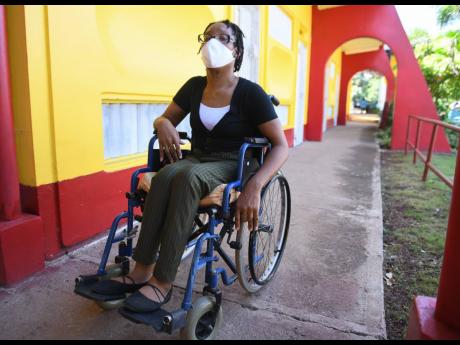Cabbies stick up disabled commuters - Wheelchair users forced to pay triple fares by rogue taxi drivers
Social distancing was a daily reality for persons with disabilities (PWDs) in rural Jamaica long before COVID-19, as wheelchair users, in particular, reported often being extorted by route taxi operators who require them to pay more than triple the usual fare to get around.
Robert Blake, a member of the Cornwall Combined Disabilities Association Benevolent Society, said that an able-bodied commuter can expect to pay anywhere between $100 and $150 to get from their community to a town centre, but a wheelchair user is sometimes charged as much as $500.
“If they lifting up the wheelchair and putting it in the back of the car, you need to pay for that like it is something different you are carrying, and it is the wheelchair you have to use to get you to wherever you need to go,” he said.
ORGANISATION MANDATE
The association represents persons with disabilities in St James, Westmoreland, Hanover, Trelawny, and sections of St Elizabeth. There have been reports in all these parishes from persons who have reportedly been shunned by taxi operators.
“Sometimes for hours you will wait and you don’t get any vehicle, you have to even go back home,” Blake told The Gleaner.
That is one of the issues that will draw greater scrutiny as Jamaica joins the world in commemorating International Day of Persons with Disabilities on Thursday, December 3.
Blake said that it is often assumed that blind commuters either do not have any fare or do not know where they are going. The upshot: Taxi operators, eager to eke out as much money from their hustle, are often too impatient to seat a blind person or fold a wheelchair.
“Him just a run a thing for a man and a try make a quick buck and just a move, so him don’t want you to delay him and let no police come catch him, because he is going to have to lift out your wheelchair, so he is going to have to stop, physically come out of the car, so all of that demands work,” Blake explained.
“They are not aware that they, too, can become disabled at any time, and they, too, can face the same thing,” lamented Blake, who is blind.
The 2014 Jamaica Survey of Living Conditions reported that the majority of PWDs reside in rural Jamaica. At the time, 51.9 per cent of the overall 220,000 disabled population lived in rural areas, compared to 31.8 per cent in the Kingston Metropolitan Area (KMA).
A situational analysis of PWDs published in 2018 by UNICEF, in collaboration with Digicel Foundation and the Jamaica Council for Persons with Disability, highlighted transportation as a major issue for those with disabilities.
“There was the general consensus that transportation issues were greater for persons in the rural areas. The disability bus service provided by the JUTC does not extend to parishes outside Kingston and St Catherine,” the study found.
“... A few parents in St Catherine shared the experience of their children coming home late periodically because taxis refused to take them, given their intellectual disability,” researchers found.
Millicent Sankey, president of the St Ann Disabilities Association, can relate to the concerns shared by these parents, as several of her members have had similar experiences. Wheelchair users are so daunted that they hardly want to leave their homes any more.
Sankey said that while some taxi drivers treat disabled commuters with compassion, the majority are left to fend for themselves, especially during rush hour. She, too, has witnessed where PWDs have become victims of extortion.
“Definitely, they have to pay extra most times, and then people now just really don’t want to travel, they can’t be bothered,” she said.
Executive director of the Combined Disabilities Association, Gloria Goffe, has heard the concerns from rural commuters.
“You have some of them who drive past the disabled person because they are going to move too slow and they can’t bother,” she said.
Despite myriad reports of extortion of disabled commuters, president of the National Council of Taxi Associations, Allan Blair, said he has never got any such reports. His association represents 20 others that advocate for taxi operators across the island.
“I know there are taxi operators who carry them, so I’m not sure about that allegation,” Blair said, promising to consult with cabbies.
Commuters in the KMA do have their challenges, too, despite prolonged advocacy that has resulted in persons with disabilities getting designated buses or having assigned seats in buses operated by the state-owned Jamaica Urban Transit Company. One such challenge is the refusal by some passengers to vacate the seats reserved for those with disabilities.
“In some communities, the commuters, they are the ones who will carry on real bad when somebody sits in those seats and somebody who is disabled or elderly comes in and can’t get any seat, so they are also our advocate,” Goffe said.

